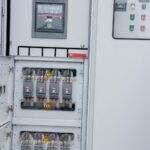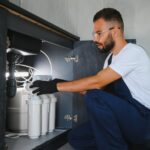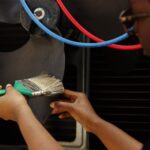Strange noises coming from your heat pump can be more than just an annoyance—they’re often harbingers of underlying issues that, if left unaddressed, could lead to costly repairs or compromised efficiency. Whether it’s a persistent whirring or an alarming bang, understanding the origin of these sounds isn’t just for the curious; it’s crucial for maintaining the comfort and cost-effectiveness of your home’s heating system.
- Common causes: Discover the typical reasons your heat pump might start producing unusual noises and how pinpointing these causes can streamline troubleshooting.
- Different noise types: Gain insight into what specific sounds like whirring or banging signify about your heat pump’s condition and functionality.
- Practical solutions: Learn effective methods to address and resolve the noises, ensuring smooth and efficient operation of your heat pump system.
Exploring this guide will not only help you diagnose and fix odd sounds in your heat pump but also enhance its longevity and performance. Dive into these insights to maintain a quieter and more efficient home environment, and consider expert assistance if needed.
Common Reasons Why Is My Heat Pump Making Strange Noises? Troubleshooting Vibrations
Heat pumps are efficient systems for maintaining a comfortable home environment, but sometimes they can produce unusual sounds that signal an underlying issue. Understanding the common reasons behind these strange noises is crucial for timely troubleshooting, ensuring your system operates smoothly.
One of the most frequent causes is loose components within the heat pump system. Over time, screws, bolts, and other fasteners may loosen due to regular operation, leading to vibrations and rattling sounds. Checking for and tightening any loose parts can often resolve the noise issue.
Another reason could be debris accumulation. Outdoor units, which are exposed to the elements, can gather leaves, dirt, or twigs. These obstructions may cause clicking or buzzing noises as the debris interacts with the fan blades or other moving parts.
Additionally, worn-out motor bearings can contribute to unusual sounds. These bearings enable the motor to run smoothly, and wear and tear over time might lead to grinding or whining noises. Regular maintenance helps in identifying such issues early.
Other potential causes might include refrigerant leaks, which often produce a hissing noise, or issues with the compressor, the heart of the heat pump, leading to more serious sounds like banging or clunking.
Identifying Noise Types: From Whirring to Banging
Each noise coming from your heat pump can indicate a specific problem that requires attention. Recognizing these sounds can help pinpoint the issue more effectively.
A whirring noise is commonly associated with the fan. It can suggest an issue with the fan blades, such as debris striking the blades or an imbalanced fan motor. Addressing this early can prevent further damage to the system.
Banging or clunking sounds are often more concerning. These noises might indicate a severe issue with the compressor or loose components inside the unit. Immediate investigation and repairs are recommended to avoid further damage.
A humming or buzzing noise could signify electrical issues within the system. It might stem from failing electrical connections or a failing capacitor, both of which require professional attention.
Lastly, a gurgling noise often indicates a refrigerant leak or air bubbles in the refrigerant line. This needs immediate addressing, as it can affect the efficiency and effectiveness of the heat pump.
By understanding these sounds, you are better equipped to maintain your heat pump’s performance and address any issues before they escalate.
Effective Solutions for Why Is My Heat Pump Making Strange Noises? Troubleshooting Vibrations
Addressing strange noises in your heat pump is essential for maintaining a quiet and efficient home. Identifying the cause can be challenging, but by exploring practical methods and expert tips, you can resolve these issues effectively.
Check for Loose Parts: One of the most common reasons for vibrations and noise is loose components. Inspect the heat pump carefully for any signs of loose parts such as screws, bolts, or panels, and tighten them as necessary to reduce rattling sounds.
Inspect the Fan Blades: Misaligned or damaged fan blades can create loud whirring or banging noises. Examine the blades for any signs of wear or obstruction and ensure they are properly aligned within the casing.
Inspect the Ductwork: Vibrations can sometimes be traced back to the ductwork. Check the duct systems connected to your heat pump for any loose or disconnected sections that might be causing noise. Proper insulation around ducts can also minimize vibrations and sound transmission.
Lubricate Moving Parts: Friction between moving parts can cause needless noise. Regularly lubricate components like the motor and bearings to keep them running smoothly, which can significantly reduce mechanical noises.
Assess the Unit’s Placement: Positioning can affect the vibration levels of a heat pump. Ensure that it’s installed on level ground, and consider using anti-vibration mounts or pads to absorb sound and adjust for uneven surfaces.
Professional Maintenance: If the noise persists after addressing these potential issues, it might be time to call in a professional. A certified technician can provide comprehensive troubleshooting and maintenance, ensuring optimal performance and extending the lifespan of your heat pump.
By implementing these practical solutions, you can effectively reduce unwanted noise, enhancing the comfort and energy efficiency of your home’s heating system. Regular maintenance not only resolves existing noise problems but also prevents future issues, providing peace of mind and operational reliability.
Frequently Asked Questions About Heat Pump Noises
What are common causes of noise in a heat pump?
- Loose parts
- Debris causing obstruction
- Worn-out motor bearings
Why does my heat pump make a banging noise?
A banging noise could indicate a loose or broken part inside the compressor.
What does a whirring noise signify?
A whirring noise often indicates issues with the fan or motor bearings.
How can I fix vibrations in my heat pump?
Ensure all parts are tightened and inspect for proper alignment and balance.
When should I call a professional?
If noises persist or you detect a burning smell, consult a professional immediately.





